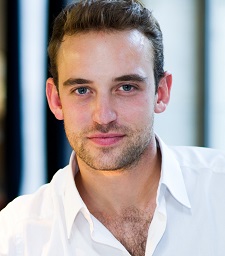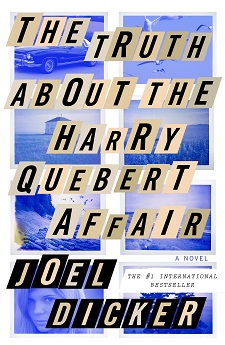
Joël Dicker’s The Truth About the Harry Quebert Affair (Penguin) is one of the summer’s most talked about novels. Now making its U.S. debut, the Swiss-born, 29-year-old’s novel became an immediate international bestseller when it was released in Europe during 2012.
Set in a quintessential small town in New Hampshire, the novel revolves around Marcus Goldman, a young author who had a massive blockbuster a couple of years ago and is now suffering from a massive bout of writer’s block. Then Marcus’ mentor, Harry Quebert, is arrested for murder when the body of Nola Kellergan is found on his land more than 33 years after the teenager disappeared. Marcus travels to New Hampshire to support Harry, and, as a result, may find his way into his next book.
Here's a brief chat with Dicker, left.
Q: The Truth About the Harry Quebert Affair weighs in at 636 pages; did you ever think about making it shorter?
A: I cut over 300 pages while writing this book. So, I guess I can tell you that the story could have been even longer! On a more serious note, I did ask myself if I should take out a few of the twists. But in the end I preferred to leave the book as it was, in order to convey my own enthusiasm to my readers.

Q: What are your favorite novels?
A: The Sea Wall, by Marguerite Duras. Of Mice and Men, by John Steinbeck. Belle du Seigneur, by Albert Cohen. Poor Folk, by Doistoievski.
Q: Are you amazed at the response that The Truth About the Harry Quebert Affair received in the European markets?
A: Obviously: how could I have ever imagined, when signing the publication of my book in a tiny Parisian publishing house, that my book would be translated into 37 languages and read by millions of people? I am very thankful for everything that is happening to me.
Q: What are your thoughts about The Truth About the Harry Quebert Affair being compared to Lolita?
A: There’s nothing comparable. When imagining that I would develop the novel around a relationship between Nola and Harry, I immediately thought of Lolita. And therefore my allusion in the book with N-O-L-A. It was my way of mentioning the inspirations that arise in the creative process. I had read Lolita only once, when I was 15. I re-read it a few months ago, after my book’s success, and I realized that I hadn’t understood everything in the book.
Q: What are you most proud of in The Truth About the Harry Quebert Affair?
A: When I receive messages from my readers, especially young readers, who tell me they weren’t big readers, but that my book got them started and now they want to read more books. I think we all have to work hard to encourage people around us to read more.
Q: Who do you read?
A: I’m a really open reader. I read just about everything that I come across. Lots of French and American literature. Right now, I’m reading Jean-Christophe Ruffin’s last book, as well as Good People by Nir Baram. Two very good books.


